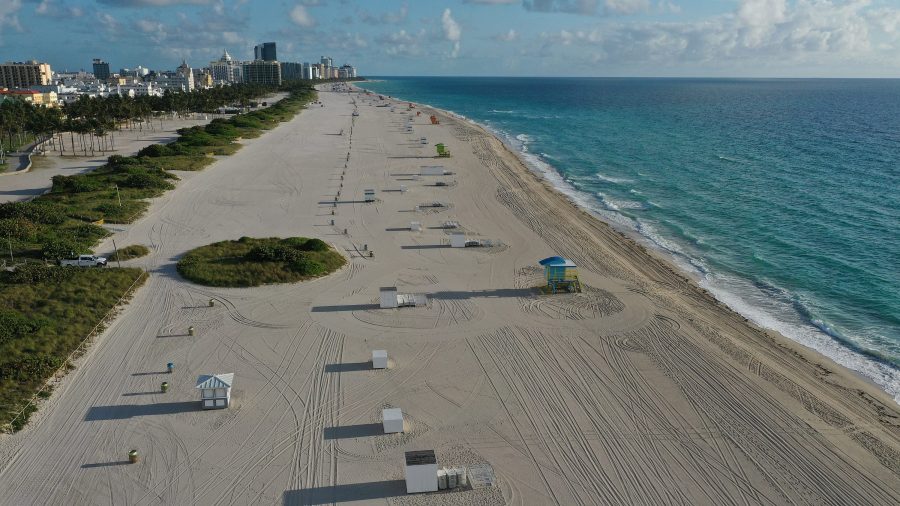Introducing “How We Survive Season 2: Saving Miami”

There’s the vacation brochure version of Miami that’s all about wealth, glamour and a never-ending party on the beach.
And then there’s the real Miami, a city that could eventually be swallowed up by the Atlantic Ocean because of glaciers melting halfway around the world.
Miami is one of the most vulnerable coastal cities in the world because of climate change. By the end of the century, sea levels around Miami could rise by 5 feet or more, submerging many neighborhoods and making them unlivable. Statewide, up to $23 billion worth of existing property will likely be underwater by 2050. South Florida could be one of the first regions in the United States to see true devastation wrought by the climate crisis, devastation that threatens its very existence. This season of “How We Survive” follows the money to the end of the world — in this case, South Florida. More than a billion dollars in state and federal aid is pouring into the region to help it adapt to hotter temperatures, fierce storms and rising waters. Miami-Dade County has developed a resilience blueprint to raise roads, upgrade infrastructure and “live more with water.” Homeowners who can afford it are elevating and “fortifying” their homes to withstand floods and hurricane-force winds. But will it be enough?
This season, we’ll dig into the messiness of solutions. We’ll look at how the insurance industry is determining where people live, and how broken that industry is in Florida. We’ll look at “managed retreat,” the process of relocating entire communities from unliveable places. And we’ll answer: How do you live in a place that wasn’t meant for massive development? And should we continue to try?
“How We Survive,” season two, is out Oct. 19. New episodes drop every Wednesday.
How We Survive Season 2 “Introducing” Transcript
Note: Marketplace podcasts are meant to be heard, with emphasis, tone and audio elements a transcript can’t capture. Transcripts are generated using a combination of automated software and human transcribers, and may contain errors. Please check the corresponding audio before quoting it.
Amy Scott: Miami! There’s the mythical version of reality TV and pop songs. The wealth, the glamor.
Archival: The gleaming towers of Miami Beach set against the dazzling blue of the sea…
Amy Scott: The never-ending Party on the beach. And then there’s the real Miami, a deeply unequal place that’s going to be swallowed up by the Atlantic Ocean because of glaciers melting halfway around the world.
Speaker 1: Society is about to be flung off of the coast, because we’ve totally screwed it up.
Speaker 2: I have nightmares. 50,000 Dead in Miami from a heatwave.
Speaker 3: You’re just buying people a few extra years to say goodbye to their loved ones. And that’s what’s happening Miami. It’s hospice care.
Amy Scott: By the end of the century, sea levels in Miami could rise by five feet or more.
Speaker 4: Large amounts of neighborhoods in the Miami Metro are going to be unlivable, completely unlivable.
Amy Scott: I’m Amy Scott, and this is How We Survive, where we’re following the money to the end of the world. In this case, South Florida, where flooding has become the norm.
Speaker 5: The neighbor next door to me lost his dog in the flood.
Speaker 6: Cars were literally floating.
Amy Scott: And hurricanes are getting stronger and wetter.
Speaker 7: The water was coming through the walls. I thought I was gonna see Jesus.
Speaker 8: Oh, we were praying.
Speaker 9: I feel like Dorothy on the Wizard of Oz.
Speaker 2: We’re one hurricane away from game over.
Amy Scott: Don’t get me wrong, there’s still some denial. Do you worry about it?
Speaker 10: I don’t.
Speaker 11: I don’t.
Speaker 12: The climate ain’t changing.
Amy Scott: Why do you think that?
Speaker 12: Because.
Amy Scott: But climate change isn’t some distant threat. It’s happening now. And people in South Florida are going through it. I can imagine the grief. I mean, how do you cope with that?
Speaker 2: There is no way I can deny that I am clinically depressed on several levels.
Amy Scott: It’s a lot, I know. But there are solutions. Communities are coming up with ways to adapt. Call it the three stages of climate survival. There’s phase one, defend.
Speaker 13: We are building strong and keeping Mother Nature out.
Speaker 14: Build higher and stronger or divert the water.
Speaker 13: We know how to design for the hurricane coastline. Build it right, build it to last.
Amy Scott: Stage two: accommodate.
Speaker 15: Water will find a way.
Speaker 16: We said embrace the water.
Speaker 15: You got to figure out a way to live with it.
Amy Scott: Wow. It is beautiful, not what you picture when you picture a house on stilts.
Speaker 16: Everybody says our homes float.
Amy Scott: And stage three, retreat.
Speaker 17: Whenever it comes to us using the word retreat, it’s not easy. This is the only place I’ve ever known as home.
Amy Scott: You think Miami has a good 20, 30 years and then what?
Speaker 2: And then we gotta go.
Amy Scott: The climate crisis is here for all of us, no matter where we live.
Archival: A catastrophic situation unfolding in Kentucky at least 30 people are dead… fire making an explosive run through volcanoes… Hurricane Ian has officially made landfall on Florida’s west coast.
Amy Scott: So what can we learn from South Florida before it’s too late?
Speaker 18: We are a living laboratory for climate change. We’re facing this now.
Speaker 19: We adapt or we lose, we become dinosaurs. So we really have no choice.
Amy Scott: How We Survive. Season Two. October 19.












